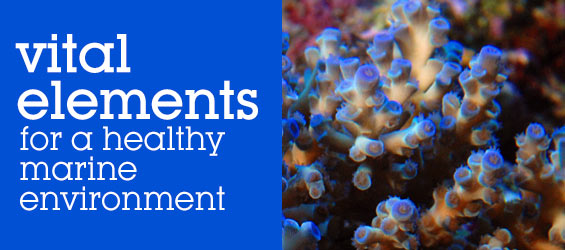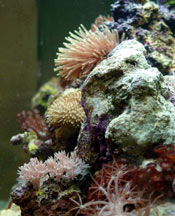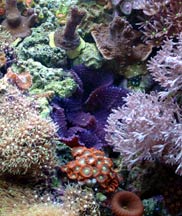Mike Paletta - Guest Author

Natural seawater contains virtually every element known on earth. Corals, invertebrates, fish and algae use many of these elements in their biological processes. Many of these elements and compounds are present in very low levels in the ocean and on the reef. But, the animals present there have almost constant exposure to water moving across them, which allows them to remove small amounts constantly.
In a closed system, like your aquarium, this is not the case. There is a finite amount of these trace elements present and, as a result, these elements can be rapidly depleted. The elements are broken down into two types, major elements and trace elements.
Major Elements
Of the major trace elements, the only ones that need to be supplemented are calcium, strontium, carbonate, and occasionally magnesium.
 Calcium - In natural seawater, calcium is in a concentration of approximately 420 ppm. It is a crucial element for stony corals, clams, and calcareous algae. Clams and corals extract it from the water and use it to build their skeletons. It should be tested for regularly, for as animals grow over time, they will extract it at an increasing rate. Ways to replenish the calcium within your aquarium include: liquid and powder calcium additives, kalkwasser, or a calcium reactor.
Calcium - In natural seawater, calcium is in a concentration of approximately 420 ppm. It is a crucial element for stony corals, clams, and calcareous algae. Clams and corals extract it from the water and use it to build their skeletons. It should be tested for regularly, for as animals grow over time, they will extract it at an increasing rate. Ways to replenish the calcium within your aquarium include: liquid and powder calcium additives, kalkwasser, or a calcium reactor.
Strontium - Strontium is very similar to calcium in terms of its benefits to the aquarium. Many organisms use strontium in the development of their skeletons. Its regular addition has been found to increase the growth rates in both hard corals and coralline algae. Testing for strontium is more involved than many of the other elements, so it is important to follow the manufacturer's instructions. Strontium is available in both liquid and powder form, and is also replenished with the use of a calcium reactor.
Carbonate - Carbonate acts as a carbon source for many of the marine animals, and acts to buffer the pH of the aquarium water. Alkalinity is the term used to measure the amount of carbonate in saltwater. In order to maintain proper pH levels in the aquarium, we want to keep this level in the range of 8 to 12 dKH. Use a quality buffer in either liquid or powder form to maintain this level.
Magnesium - Magnesium, along with the other minerals already mentioned, is responsible for the regulation of pH and the formation of your invertebrates' skeletons. Although it is used at a much slower rate than calcium or strontium, it may become necessary in time to supplement this mineral. It is available in both powder and liquid form, and should be used when problems with low pH are encountered and all other minerals are in appropriate levels.
 Minor Trace Elements
Minor Trace Elements
The following elements are present in natural seawater in much lower concentrations, but are equally important to the health of the fish, corals, and invertebrates.
Iodine and Iodide - Iodine is rapidly oxidized in the aquarium and as such should be added in very small amounts daily. It is essential for the health of many soft corals such as Xenia and may also have antibiotic properties in stony coral aquariums, which may also enhance their coloration. Iodine is available in liquid form, and the manufacturer's recommendations should be followed to avoid overdosing.
Iron -
Iron is beneficial to all photosynthetic invertebrates and plants as it provides added nourishment to the photosynthetic cells. This results in improved coloring, growth, and expansion within these organisms. Iron is available in a liquid form, and is also included in many of the general trace element products.
Molybdenum - Molybdenum has been found to aid the biological processes of many of the beneficial strains of bacteria. It is available in liquid form and should be gradually introduced into the aquarium to avoid outbreaks of cyanobacteria.
General Trace Elements - The saltwater trace elements are formulations covering all of the minor trace elements that are present in natural seawater. Use these products to replenish all of the minor elements that have been reduced by the aquarium's inhabitants.
Understanding trace elements and using them properly is not that complicated once a general understanding of what they do and what their levels should be is achieved. Fortunately, all of these elements are now available in easy-to-use preparations and tests for almost all of them are also now available. As a result, keeping the water chemistry in a saltwater tank close to that of a natural reef is now possible. Even new hobbyists can achieve great success in a relatively short time simply by testing the water regularly and adding these elements as necessary.
|